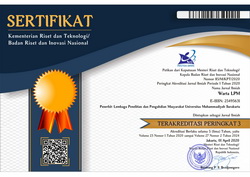Promosi Kesehatan Mental melalui Pelatihan Keterampilan Sosial pada Warga Pondok pesantren
DOI:
https://doi.org/10.23917/warta.v27i1.2818Keywords:
Keterampilan Sosial, Pondok Pesantren, Promosi Kesehatan MentalAbstract
Social skills are an important aspect that needs to be developed for students because they are a protective factor in creating mental health. It's just that this is one aspect that is still underdeveloped in students. Social skills can be instilled in individuals in various ways, one of which is through training. This community service activity is in the form of Training for Trainers, which aims to increase the capacity of stakeholders to have higher social skills so that they can become role models for students. Participants involved in this activity were administrators, teachers, and caregivers of 30 students. The training lasted 2 meetings, each 3 hours. The training material includes adolescent dynamics, social skills, and the implementation of social skills through the FRESH values, which is an acronym for Friendly (friendly, likes to make friends), Respect (respect), Empathy (empathy or mutual understanding), Smile (smile or friendly to everyone), as well as Humble (humble and not feeling superior to others). The effectiveness of the training was measured using a questionnaire to determine improvements in FRESH implementation. Data were analyzed using central tendency statistics and described narratively. The results show that there has been an increase in the application of FRESH values among dormitory managers, teachers, and caregivers. This improvement is the key to continuous change towards more comfortable and harmonious conditions in Islamic boarding schools, considering that boarding school managers, teachers, and caretakers are the main role models for students while living in Islamic boarding schools. It can be concluded that social skills training through training for trainers has proven effective in improving the social skills of managers, teachers, and caregivers as role models to be imitated by students.
References
Adeniyi, Y. (2016). Effect of a classroom-based intervention on the social skills of pupils with intellectual disability in Southwest Nigeria. Child and Adolescent Psychiatry and Mental Health, 10(1). https://doi.org/10.1186/s13034-016-0118-3
Alcover, C. (2022). Measuring Changes in Social Skills Throughout an Intervention Program for Children with ASD, Contributions from Polar Coordinate Analysis. Journal of Autism and Developmental Disorders. https://doi.org/10.1007/s10803-022-05496-0
Angacian, S. (2015). School-Based Intervention for Social Skills in Children from Divorced Families. Journal of Applied School Psychology, 31(4), 315–346. https://doi.org/10.1080/15377903.2015.1084964
Balderaz, L. (2020). Social Skills Interventions for Adults with ASD: A Review of the Literature. Journal of Psychosocial Rehabilitation and Mental Health, 7(1), 45–54. https://doi.org/10.1007/s40737-020-00158-9
Bankart, J. (2021). Social skills interventions in young adults with autism spectrum disorder: Comment on Chien et al. In Psychological Medicine. https://doi.org/10.1017/S0033291721003998
Barnes, G. (2017). The social play, social skills and parent–child relationships of children with ADHD 12 months following a RCT of a play-based intervention. Australian Occupational Therapy Journal, 64(6), 457–465. https://doi.org/10.1111/1440-1630.12417
Brunner, M. (2022). ‘It gives you encouragement because you’re not alone’: A pilot study of a multi-component social media skills intervention for people with acquired brain injury. International Journal of Language and Communication Disorders. https://doi.org/10.1111/1460-6984.12806
Daffner, M. S. (2020). Enhancing Social Skills of Young Children With ADHD: Effects of a Sibling-Mediated Intervention. Behavior Modification, 44(5), 698–726. https://doi.org/10.1177/0145445519843473
DiPerna, J. C. (2018). A cluster randomized trial of the Social Skills Improvement System-Classwide Intervention Program (SSIS-CIP) in first grade. Journal of Educational Psychology, 110(1), 1–16. https://doi.org/10.1037/edu0000191
Elliott, S. N., & Gresham, F. M. (2008). SSIS-RS performance screening guide. MN: NCS Pearson.
Evans, S. W., Axelrod, J. L., & Sapia, J. L. (2000). Effective school-based mental health interventions: Advancing the social skills training paradigm. Journal of School Health, 70(5), 191–194. https://doi.org/10.1111/j.1746-1561.2000.tb06471.x
Feist, J., & Feist, G. J. (2010). Teori kepribadian. Salemba Humanika.
Gresham, F. M., & Elliot, S. N. (1990). Social skills rating system manual. American Guidance Service.
Gresham, F. M., Elliott, S. N., Vance, M. J., & Cook, C. R. (2011). Comparability of the social skills rating system to the social skills improvement system: Content and psychometric comparisons across elementary and secondary age levels. School Psychology Quarterly, 26(1), 27–44. https://doi.org/10.1037/a0022662
Hertinjung, W. S., Partini, P., & Raihana, P. A. (2017). Strategi coping santri tahfidz quran studi eksplorasi di pondok pesantren tahfidz quran. Seminar Nasional Mendidik Anak Sehat Dan Bahagia, 250–260.
Heyeres, M. (2019). Strengthening the Capacity of Education Staff to Support the Wellbeing of Indigenous Students in Boarding Schools: A Participatory Action Research Study. Australian Journal of Indigenous Education, 48(1), 79–92. https://doi.org/10.1017/jie.2017.42
Irawan, C., & Hertinjung, W. S. (2017). Profil intelegensi pada santri tahfidzul Qur’an. Seminar Nasional Penguatan Individu Di Era Revolusi Informasi.
Karyani, U., Paramastri, I., & Ramadani, N. (2016). Riset terkini intervensi berbasis sekolah untuk promosi kesehatan mental siswa: Review sistematis. Seminar ASEAN 2nd Psychology & Humanity, 456–478.
Karyani, U., Prihartanti, N., Prastiti, W. D., Lestari, R., Hertinjung, W. S., Prasetyaningrum, J., Yuwono, S., & Partini, P. (2014). Wellbeing on child’s perspectives. Paper Presented on The 5th Asian Association of Indigenous and Cultural Psychology.
Khotimah, R. P., Setyaningsih, N., Masduki, M., & Sutarni, S. (2021). Pelatihan penyusunan soal matematika berbasis Higher Order Thinking Skills (HOTS) bagi guru-guru SMP Muhammadiyah Klaten. Warta LPM: Media Informasi Dan Komunikasi Hasil Pengabdian Kepada Masyarakat, 24(4), 646–655. https://doi.org/https://doi.org/10.23917/warta.v24i4.14222
Lestari, S. D., & Hertinjung, W. S. (2017). Hubungan antara kecerdasan emosional dengan stres dalam menyusun skripsi pada mahasiswa fakultas psikologi Universitas Muhammadiyah Surakarta. Universitas Muhammadiyah Surakarta.
McDonald, B. (2020). Improving teaching and learning through experiential learning. Cambridge Scholars Publishing.
Nangle, D. W. (2020). Social Skills Across the Life Span: Theory, Assessment, and Intervention. In Social Skills Across the Life Span: Theory, Assessment, and Intervention. https://doi.org/10.1016/C2018-0-01560-1
Salsabilla, S. B., Samudra, E. A. H., Puspanoti, A., Ramadhani, A. N., & Ruhaena, L. (2022). Psikoedukasi sebagai solusi terhadap Penyesuaian siswa SMA Al Islam 1 Surakarta terhadap pembelajaran campuran saat pandemi. Abdi Psikonomi, 3(2), 99–106. https://doi.org/10.23917/psikonomi.vi.735
Spence, S. H. (2003). Social skills training with children and young people: Theory, evidence and practice. Child and Adolescent Mental Health, 8(2), 84–96. https://doi.org/10.1111/1475-3588.00051
Downloads
Submitted
Published
How to Cite
Issue
Section
License
Copyright (c) 2024 Warta LPM

This work is licensed under a Creative Commons Attribution 4.0 International License.















